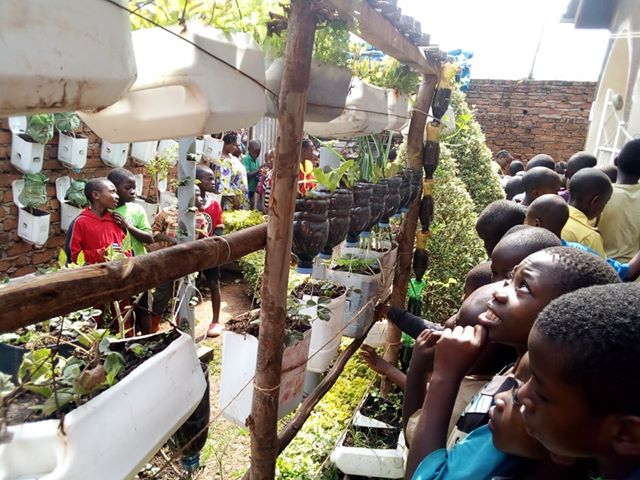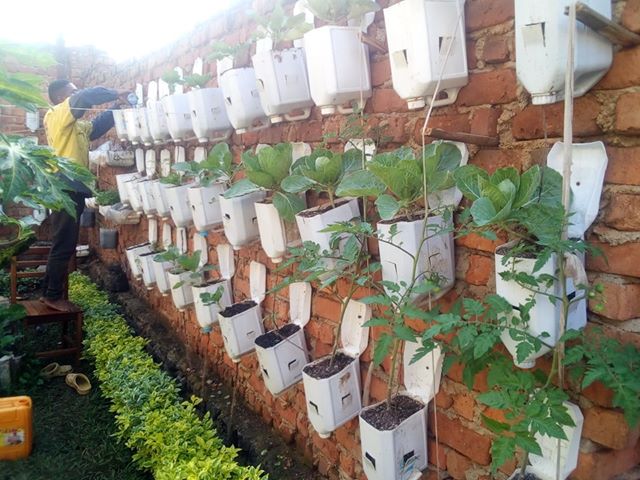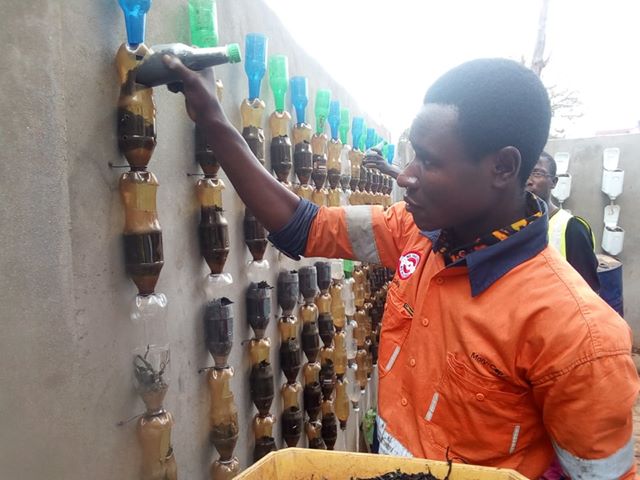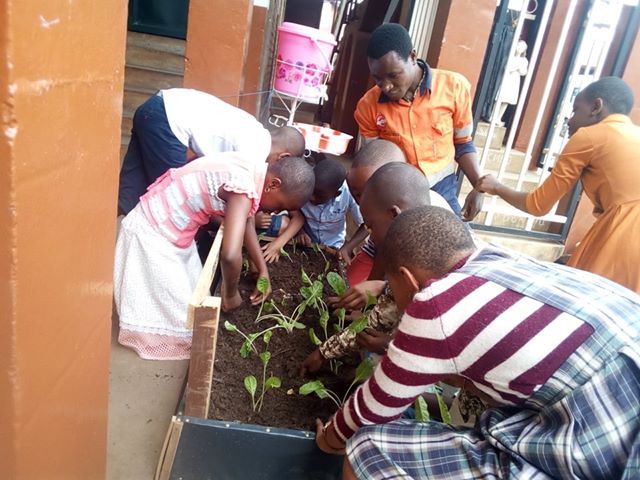Podcast: Democratic Republic of Congo - Murhula's bottle garden
In a new series of interviews with container growers from around the world, I'm delighted to introduce a true pioneer in urban container growing. He is Murhala Zigabe, founder of Briquette de Kivu. He grows food in the city of Bukavu in the Democratic Republic of Congo (DRC). Listen to his story in the podcast below. The DRC is a country deeply scarred by conflict and poverty. Amid the darkness of his country's recent history, Murhula is courageously working to create hope and meaning by supporting children and families to grow food at home.
 With urbanisation, kids are becoming disconnected from the land and nature. Murhala is inspiring them through stories. And gives them the opportunity to grow their own food. The idea came to Murhula after he created a garden on the wall of his yard. He grew so much food that lots of people wanted to find out how he did it.
With urbanisation, kids are becoming disconnected from the land and nature. Murhala is inspiring them through stories. And gives them the opportunity to grow their own food. The idea came to Murhula after he created a garden on the wall of his yard. He grew so much food that lots of people wanted to find out how he did it.
Part 1: Inspiration and how to grow with recycled resources.
Murhula tells us about the situation in the DRC, his inspiration for starting the project, how he is engaging young people in it, and the ways he is growing food on walls using recycled and waste resources.
Part 2: Vision for the future
Murhula shares some of his learning from the project, and his vision for the future - including an exciting invitation he has had to attend the Paris Peace Forum.
 Plastic bottles and containers are salvaged from waste and repurposed as containers.
Plastic bottles and containers are salvaged from waste and repurposed as containers.
Creative, resourceful growing
Growing in a city with few resources and low incomes means Murhula is creative and resourceful in his growing. He:
- Reclaims containers from rubbish dumps.
- Uses soil dug up from the ground and mixed with homemade compost.
- Makes liquid fertiliser tea by soaking banana skins, eggshells and carefully chosen weeds (particularly Titonia Diversiflora - a fascinating plant worth investigating) .
- Soaks cow dung in water and boils it to make another liquid fertiliser.
- Minimise water use by stacking containers one above each other - to catch water drips.
 Soil is dug up from the ground and mixed with homemade compost to fill the containers. Tools are made from plastic bottles.
Soil is dug up from the ground and mixed with homemade compost to fill the containers. Tools are made from plastic bottles.
The role of food growing
Food is increasingly expensive in the DRC (much is now imported). Fresh fruit and veg is unaffordable for many families. So growing at home enables people to eat onions, tomatoes, strawberries and much more at an affordable price. Murhala has observed how growing can bring families together. And how it offers a meaningful hobby for children who otherwise have little to do and hope for. It also offers potential for entrepreneurship. For young people to start farms and small local food businesses in the city.
Rebuilding connections with the land
Another big issue is rapid urbanisation. The children in Bukavu and other DRC cities are growing up disconnected from the land and farming. Murhula is inspiring children to reconnect with the earth and growing. He tells them stories to help them see the connections between people, plants and animals. And how we all need each other to survive. According to USAID: "only about 10 million of the country's 80 million hectares of arable land are under cultivation. Increasing the amount of land under cultivation has enormous potential to increase food security and sustainable, equitable economic development." Murhala is hoping his work will inspire more people to go back the land to start growing - and equip them with the skills to do so. [caption id="attachment_6730" align="aligncenter" width="640"] Murhula is training young people in food growing to help feed the city in the future.
Murhula is training young people in food growing to help feed the city in the future.
Videos that helped Murhula
Murhula learnt to grow food by watching YouTube videos. Here are links to some he found helpful: How to make a Vertical Planter. How to Make a Vertical Flower Bed. How to make Banana Peel Fertiliser. Enjoy!
Your turn
If Murhula's story inspires you or you picked up any practical tips, I'd love to hear from you in the comments below.

1 comment
Leave a comment